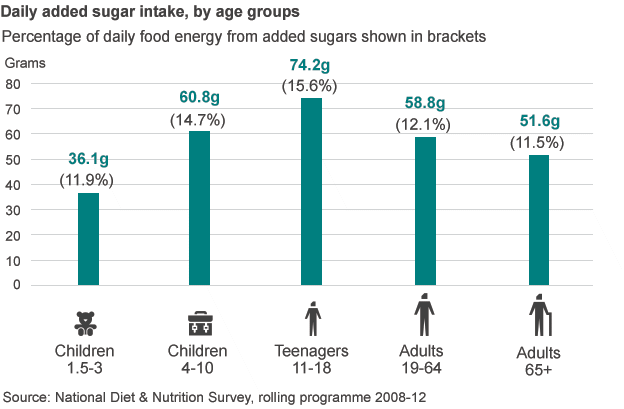Sugar in Foods
On average, we are eating more than twice the sugar* than guidelines recommend.Government Consumption Guidelines
No more than 5% of our energy should come from Sugar
World Health Organisation, 2015
The World Health Organisation (W.H.O.) recommendation on sugar intake is based on sugar as a proportion of all energy (kcal or kj). The guideline maximum proportion of energy taken on from all sugars (intrinsic and added) is: 5% and a strong recommendation of an absolute maximum of 10%
The energy value of a gram of Sugar is 3.8 kcal.1 (p.93)
Recommended maximum sugar intake for age: 25-34 and sex:female is
10% x 2175 / 3.8 = 28.62g of Sugar per day
7.2 cubes
.
and the Absolute maximum is
57.2g of Sugar per day.
NHS, May 2015
"Added sugars shouldn’t make up more than 10% of the energy (calorie intake) you get from food and drink each day. This is about 70g for men and 50g for women, but it varies, depending on: your size, your age and how active you are."SACN, Carbohydrates and Health, July 2015
"Free sugars shouldn’t make up more than 5% of the energy (calorie intake) you get from food and drink each day. Carbohydrates & Health, SACN 2015Current Levels of Consumption
12-15% of our energy actually comes from Sugar
Courtesy of the BBC:

On average, we are eating more than twice the sugar than the W.H.O. & SACN guidelines recommend.
** All information is based on external, referenced sources. inFood provides no advice on food, medical or nutritional matters.
Principal Sources
- The 2011 report by the UK Scientific Advisory Committee on Nutrition on Dietary Reference Values for Energy, available here
- The World Health Organisation Guideline for sugar intake in adults and children 2015. available here
- NHS Recommendations on Sugar Intake
Other Sources
- UK Food Standards Agency, Nutrient and food based guidelines for UK institutions, 2007
- Food Retailers and Manufacturers - on Guideline Daily Amounts
- Sugar Industry Report on Sugars, 2010